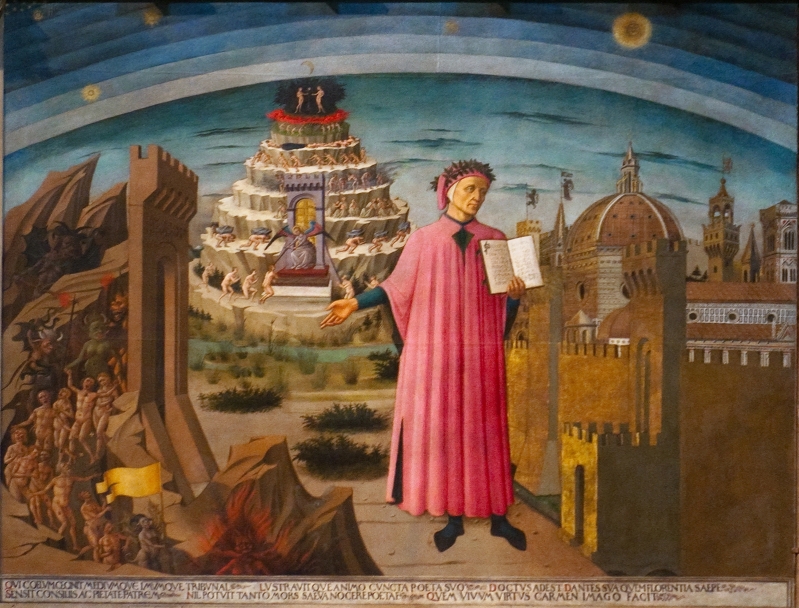
Considered Italy’s greatest ever poet and writer, Dante Alighieri is perhaps best known for his narrative poem The Divine Comedy (La Divina Commedia). As one of the most influential written works of the late Medieval period, Divine Comedy has inspired a significant number of musical works, not least WNO’s Autumn 2024 Season opera, Puccini’s Il trittico. Let’s take a closer look below.
Rachmaninoff’s Francesca da Rimini
Sergei Rachmaninoff’s opera of Francesca da Rimini is based on the fifth canto of the Inferno, the first part of the Divine Comedy. Set in the Second Circle of Hell, Francesca of Riminitells her mournful story to Dante, that she was tricked into marrying a man she did not love, and when found in anadulterous tryst with her husband’s brother, they are both killed by her vengeful spouse and trapped in the storms of hell for eternity. Rachmaninoff’s ‘symphonic opera’ was first performed in 1906 at the Bolshoi Theatre, Moscow, conducted by the composer himself.
Liszt’s Dante Symphony
Franz Liszt’s Dante Symphony was first performed in Dresden in 1857 and follows Dante Alighieri’s journey through Hell and Purgatory, as told in the first two parts of The Divine Comedy. Plans for a third movement to represent the final part, Paradiso, were cut, after Richard Wagner convinced Liszt that a composer would be unable to accurately do justice to a musical portrayal of bliss. Instead, a chorus of angels was added to the symphony’s final movement, as if Dante could see heaven from afar.
Louis Andriessen’s La Commedia
The contemporary Dutch composer Louis Andriessen is one of the most recent musicians to embrace Dante’s work as a source of artistic inspiration. La Commedia is Andriessen’s five-part ‘film opera’ that retells Dante’s story with a multi-language libretto, using verses from Dante’s original narrative, the poetry of Joost van den Vondel and extracts from the Old Testament. Dutch National Opera first premiered the opera at the Royal Theatre Carré Amsterdam in 2008.
Tchaikovsky’s Francesca da Rimini
Another great Russian composer to bring to life the story of Francesca da Rimini was Pyotr Ilyich Tchaikovsky. Originally intended for an opera, Tchaikovsky used Canto 5 of Dante’s Inferno for a dramatic orchestral tone poem composed in 1876. The score is pure Tchaikovsky – high drama, ferocious passion and great romance – and fits in perfectly with his musical catalogue of doomed love stories, not least Swan Lake, Eugene Onegin and Romeo and Juliet.
Puccini’s Il trittico and Gianni Schicchi
Finally, it can be said that Il trittico’s combination of three once-act operas correspond perfectly to The Divine Comedy’s three realms of Hell, Purgatory and Paradise with the violence of Il tabarro, the tragedy of Suor Angelica and the joy and comedy Gianni Schicchi.
The character of Gianni Schicchi in particular is featured in Canto 30 of the Inferno, a Florentine knight who has been condemned to Hell for impersonating Buoso Donati and fraudulently falsifying his will to favour him and his family. Puccini’s opera of Gianni Schicchi is a comedic take on the story and features one of opera’s most popular arias of all time, Lauretta’s O mio babbino caro (Oh my dear papa).
Do you fancy trying Puccini’s Gianni Schicchi for yourself? WNO’s Il tritticoreturns to Cardiff’s Wales Millennium Centre on 29 September, 3 and 5 October, before touring as a double bill Suor Angelica & Gianni Schicchi in Llandudno, Plymouth and Southampton with a special concert performance in Oxford in the Autumn.



